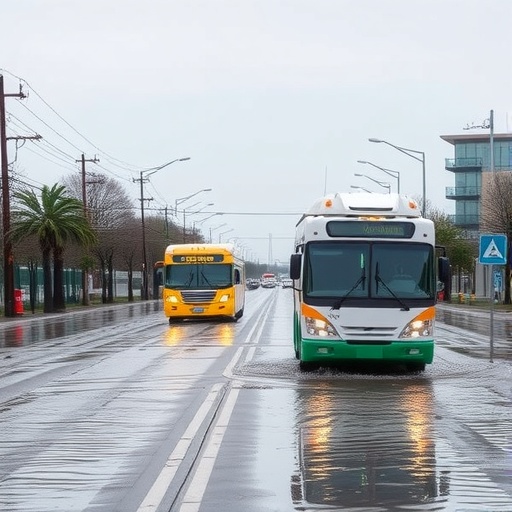In a groundbreaking study published in Commun Earth Environ, researchers have uncovered significant vulnerabilities in the German healthcare system, particularly in the context of flood-induced transportation disruptions. This issue is increasingly pressing as climate change exacerbates extreme weather conditions, leading to more frequent flooding events. The study’s authors, led by Wassmer and colleagues, emphasize that this research is essential for improving disaster response strategies and maintaining healthcare services during emergencies.
Germany is a country known for its robust infrastructure and well-organized public services, yet recent examinations reveal that even such well-prepared systems can fall prey to severe climate events. The research highlights that transportation networks, which are crucial for the delivery of medical supplies and patient mobility, become increasingly compromised during floods. For hospitals and emergency services, the ability to access patients in need or to transport them safely can make the difference between life and death.
Flooding causes physical road and bridge damage, making areas inaccessible and hampering the response times of emergency services. In a crisis situation, the disturbances in transportation can lead to severe delays in critical care delivery, particularly for patients needing time-sensitive interventions. This reality poses a significant risk to vulnerable populations, including the elderly and those with chronic health conditions who depend heavily on consistent healthcare services.
The ramifications are not limited to immediate care; the study projects that prolonged disturbances in transportation networks could lead to increased morbidity and mortality rates over extended periods. Chronic disease management, regular check-ups, and essential medication deliveries could all be disrupted. The knock-on effects may be felt long after floodwaters recede as healthcare systems struggle to regain their footing amid ongoing challenges of patient backlogs and resource allocation.
The researchers performed an extensive analysis of potential flood scenarios and assessed their impact on healthcare accessibility across various regions in Germany. By using advanced predictive modeling techniques, they were able to simulate the effects of transportation disruption on healthcare delivery. These models offer a valuable tool for policy-making, allowing for targeted interventions that can minimize the risks associated with flood events.
One of the most startling findings in this research is the fragility of rural healthcare systems when faced with natural disasters. In remote areas, where the availability of medical professionals and facilities is already limited, flooding exacerbates the existing vulnerabilities. Patients living in these regions could find themselves completely cut off from necessary healthcare services. This scenario raises significant ethical concerns regarding equity and access to care in times of crisis.
The study also explored potential mitigation strategies to enhance the resilience of healthcare systems against such disruptions. Suggestions included reinforcing infrastructure in at-risk areas, creating alternative transport routes, and implementing robust telemedicine options for patients unable to reach healthcare facilities during emergencies. By embracing digital health solutions, healthcare providers can maintain patient engagement and ensure continuity of care even when physical access is compromised.
In addition to discussing immediate healthcare implications, the research addresses the need for a broader societal awareness of climate change-induced health risks. There is an imperative for communities, policymakers, and healthcare systems to recognize the ongoing threat posed by climate-related events. Public preparedness and awareness campaigns can empower individuals to take proactive measures, such as creating emergency plans that account for possible transportation disruptions.
Furthermore, intersectoral collaboration is emphasized as a critical component of devising effective strategies. Partnerships between healthcare providers, local governments, and transportation agencies can facilitate better planning and faster response capabilities. Integrating knowledge from fields such as urban planning and environmental science can help create a more holistic approach to managing healthcare disruptions due to flooding.
A proactive approach to building resilient healthcare systems involves investing in research and technological advancements. Innovations in flood prediction, emergency planning, and infrastructure development can significantly mitigate risks associated with climate-induced transportation disruptions. Fostering an environment where research translates into actionable insights will be crucial for safeguarding public health.
The findings from this study are not limited to Germany; they resonate on a global scale, as many nations grapple with similar challenges stemming from climate change. Flooding and other extreme weather events are increasing across the globe, stressing the necessity for international collaboration in addressing these urgent public health risks. Lessons learned from this research can inform strategies in countries facing their own climate vulnerabilities, fostering a global dialogue on best practices.
In conclusion, the study by Wassmer et al. highlights an increasingly urgent need to recognize and address the hidden risks posed by climate-induced transportation disruptions in healthcare. It calls for immediate actions to improve resilience, focused research, and intersectoral collaboration to withstand future climate challenges. The stakes could not be higher; as we adapt to a changing climate, the health and well-being of communities around the world depend on our capacity to respond effectively.
Subject of Research: Climate-induced transportation disruption and its effects on healthcare delivery in Germany.
Article Title: Unveiling hidden risks in healthcare from flood-induced transportation disruption in Germany.
Article References:
Wassmer, J., Bryant, S., Schimansky, P. et al. Unveiling hidden risks in healthcare from flood-induced transportation disruption in Germany.
Commun Earth Environ 6, 676 (2025). https://doi.org/10.1038/s43247-025-02645-y
Image Credits: AI Generated
DOI: 10.1038/s43247-025-02645-y
Keywords: climate change, healthcare, transportation disruption, floods, resilience, emergency response, public health, Germany, accessibility.




